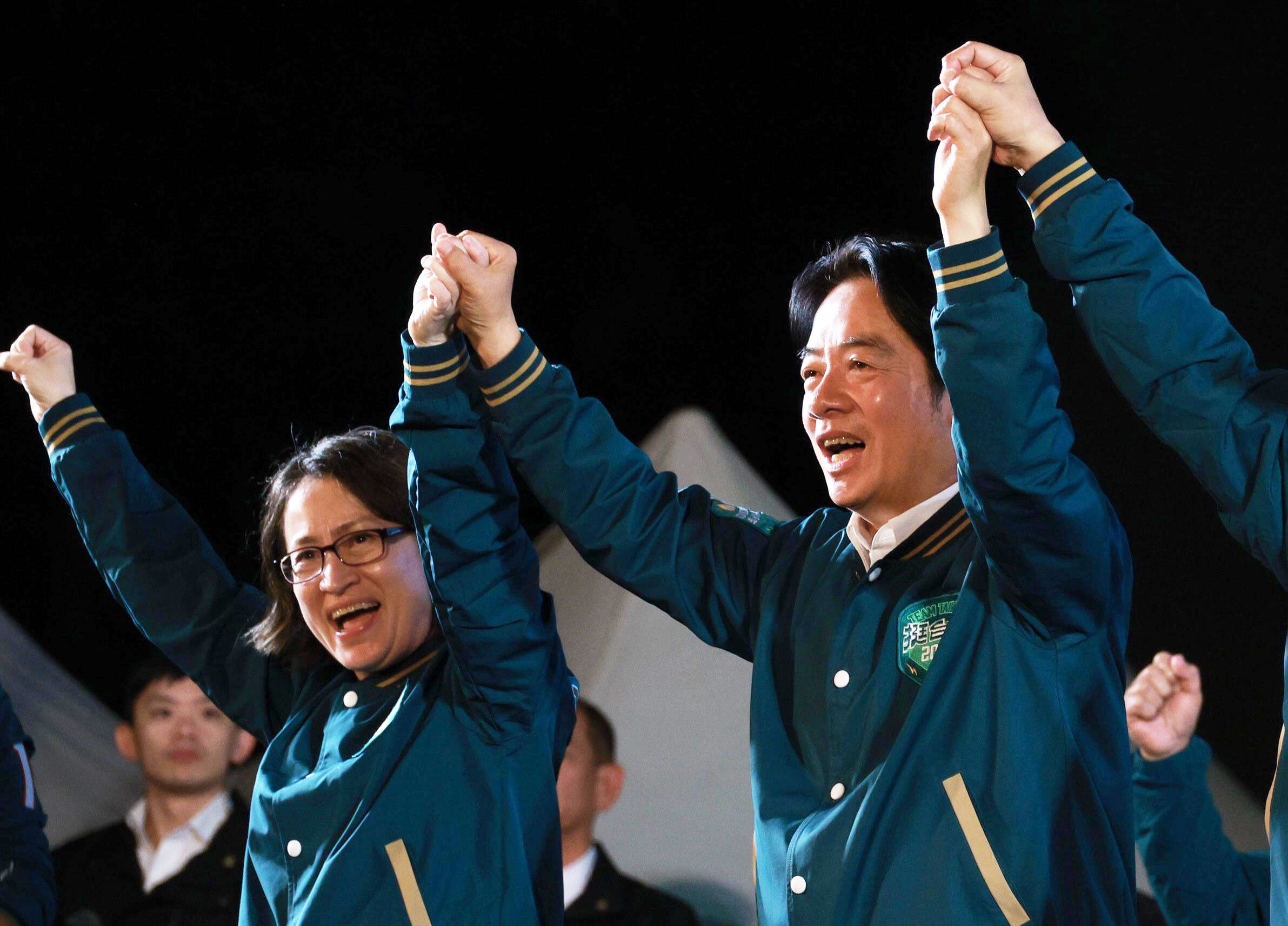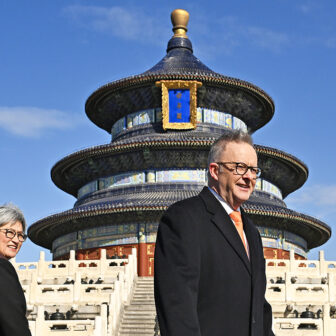Whatever the result of Taiwan’s election this Saturday, the domestic outcome is likely to be rocky. The people of Taiwan will be voting for a new president and 113 members of the Legislative Yuan, Taiwan’s parliament. Judging by opinion polls, president Tsai Ing-wen will be succeeded by her vice-president, Lai Ching-te, ensuring the Democratic Progressive Party, or DPP, a third four-year term. But the party looks likely to lose seats in the legislature even while retaining the presidency.
The DPP’s main opponent is the Kuomintang, or KMT, a party with roots deep in pre-revolutionary China and members that are far more inclined than their DPP counterparts to claim Chinese heritage. The KMT’s presidential candidate, New Taipei mayor Hou Yu-ih, is a centrist pragmatist from a local Taiwanese family, but both his running mate and the first-placed candidate on the party’s list are “deep blue” — strongly pro-Chinese figures from families that fled to Taiwan after the communist victory in 1949. Intra-party tensions reflecting these different views could complicate legislative processes after the election.
The third party fielding a presidential candidate, the Taiwan People’s Party, is predicted to retain its present strength in the legislature. It has feistily courted younger voters during the campaign.
On current predictions the next president of the legislature will be the KMT’s Han Kuo-yu, whose position on the party ticket assures him of a win despite his having made history in 2020 as the only mayor ever recalled from office by popular petition.
Outside Taiwan, the election is attracting interest more for its international than its domestic repercussions. The war in Ukraine alerted the world to the possibility of a matching war on the opposite side of Eurasia. The dramatic increase in incursions by Chinese fighter jets into Taiwanese airspace over the past two to three years resonates with the build-up of Russian forces on the Ukrainian border in the months ahead of its February 2022 invasion. From London to Tokyo, commentators have been speculating on the potential for a bellicose response to the election in Beijing.
Not surprisingly, the prospect of war has been a theme in the election campaign. KMT posters show Hou Yu-ih declaring “Peace on each shore; we don’t want war.” The fact that all candidates agree with this sentiment doesn’t stop it being invoked as a point of difference between the DPP on the one hand and the Kuomintang and the Taiwan People’s Party on the other. A widely read article by influential American commentators advocating greater restraint in Washington’s approach to Taiwan has been weaponised by the opposition parties to attack the DPP for a China policy they portray as flirting with war. China’s defence ministry has weighed in, criticising the DPP for “deliberately hyping up the so-called ‘military threat from the mainland’” for electoral purposes.
In fact, says the DPP’s Lai Ching-te, “In the eyes of Beijing, the three of us [running for president] are all supporters of Taiwan’s independence.” In this sense, Taiwan seems to have passed a point of no return in its journey towards resolving its political status. China’s claim to Taiwan is grounded largely in the historical struggle between the Communist Party and the Kuomintang, a struggle that culminated in the flight of the Kuomintang to Taiwan and its reconstitution there of the shattered government of the Republic of China. The government in Taipei has now long since ceased to be a government-in-exile, waiting for the Communist Party of China to collapse.
People in Taiwan have also stopped thinking of themselves as Chinese. Mostly, they don’t know very much about China. Research by Chinese social scientists suggests that the more they know the less they like it. Taiwanese businesses are withdrawing from China, taking their money and nous elsewhere.
All this has had a profound effect on electoral politics in Taiwan, where there is next to no interest in becoming part of the People’s Republic of China and no advantage for politicians in pro-China policies. At best, critics of the DPP can claim they will manage relations with China better than has Tsai Ing-wen, who has presided over extremely frosty cross-strait relations.
But when Hou Yu-ih’s “deep blue” running mate Jaw Shau-kong declared himself and Hou at one in their rejection of Beijing’s “one China, two systems” policy, the legacy of Tsai Ing-wen was apparent. “Regarding the ‘one country, two systems,’” said Tsai, ahead of the 2020 election, “our answer is: that is not possible.” Tsai won that election in a landslide. Now, all three current presidential candidates have put defence as their top priority.
Neither US restraint nor Taiwanese domestic politics necessarily have much bearing on the prospects of war or peace in the Taiwan Strait. If the Kuomintang were to be victorious in the presidential election, Beijing would be gratified but might not greatly alter its present course. On the 130th anniversary of the birth of Mao Zedong on 26 December, and again five days later, on New Year’s Eve, Xi Jinping declared yet again what he has often stated before, that the reunification of Taiwan with China is a historical necessity.
On this point Xi is in no danger of outraging China’s netizens, who naturally share his conviction that Taiwan belongs to China. A majority, though not an overwhelming one, supports “recovery” of the island by force. Xi has reassured Taiwanese that “Chinese people will not strike Chinese people” but left himself with a way out: “if [Taiwanese] don’t want to be Chinese, we just can’t look on and do nothing.”
Voters in Taiwan display a remarkable insouciance in face of such threats. While jets scramble overhead they go about their daily lives with barely an upward glance. They are nonetheless alert to the need for skilful management of Taiwan’s international relations. If the DPP retains the presidency despite the electorate’s favouring a rotation of power, it will be partly because Tsai Ing-wen’s assertion of the sovereignty of Taiwan and its separateness from China satisfies the views that most Taiwanese hold of themselves and their country.
Opinion polls also suggest that voters have confidence that Lai Ching-te, at heart a strong supporter of independence, will adhere to the status quo in cross-strait relations. And they have a high opinion of Lai’s running mate, Hsiao Bi-khim, who performed spectacularly well as Taiwan representative in Washington during 2020–23. With Lai focusing on domestic issues on the campaign trail and Hsiao responding on international issues, the electorate has been presented with an image of complementarity and compatibility that distinguishes the DPP’s candidates from their rivals.
Yet, in the final analysis, maintaining the status quo in Taiwan — by far the preferred option among Taiwanese voters — is likely to depend more on Xi Jinping than on the election. Xi’s dream of national rejuvenation, articulated at the beginning of his time in power, has a territorial aspect that is manifest in tensions on many of China’s borders. The conflict over Taiwan is significant partly because China’s entire diplomatic relations framework is premised on the accommodation of the politically powerful claim of “one China.”
War games conducted in the South China Sea by China and by a US–Philippines alliance just a week ahead of the Taiwan election are a reminder, however, that Taiwan forms part of the “First Island Chain,” which includes islands of Japan in the north and of the Philippines in the south. Control of the chain would give China a commanding position in the Pacific. More than Taiwan is at stake in any change in the status quo.
There are many reasons why Xi might hesitate to start a war in the Taiwan Strait. These include the dispiriting example of Russia in the Ukraine; the People’s Liberation Army’s lack of combat experience, flawed missiles and corrupt generals; the potential loss through wartime casualties of tens of thousands of “only children,” the products of China’s former one-child policy; and the parlous state of the Chinese economy in combination with the impact of the inevitable trade sanctions.
Weighed against Xi’s personal ambitions, however, all these might count for nought. Last year, Xi turned seventy. In Chinese lore, this is the age for “pursuing the heart’s desire,” but by anyone’s calculation the window of opportunity for doing so is shrinking. He has time to play with: his father lived till eighty-nine and his mother is still alive. But Mao Zedong, born an auspicious sixty years before him, died at eighty-two. Xi will want to achieve his heart’s desire before he reaches a comparable age.
A shrinking population, a slowing economy, and an underperforming global infrastructure project — the Belt and Road Initiative — mean that much on which Xi has staked his prestige is beginning to slip away. It is not impossible that he will see the election in Taiwan as offering an opportunity to respond to the call of history, reunify the nation, and establish an enduring legacy for himself. •




